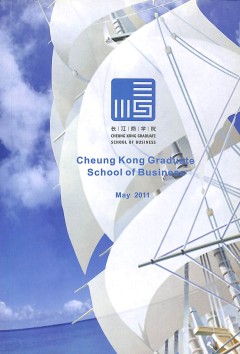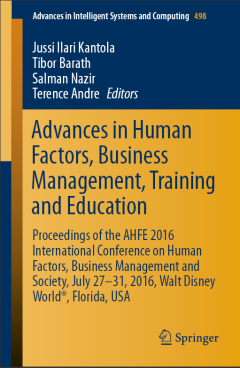Ditapis dengan

A study on educations role in establishing strategies for improving safety at…
Safety at sea is a major concern of the maritime industry and it is through education and training that continued improvement can be realized. Despite increased awareness there has often only been minimal improvement made to training programs. The steady stream of accidents and disasters at sea are testament to this situation. This paper has been written to encourage a review of present maritim…
- Edisi
- Volume 27 Number 3
- ISBN/ISSN
- -
- Deskripsi Fisik
- 18 pages
- Judul Seri
- The Asian Journal of Shipping and Logistics
- No. Panggil
- ATC MR DAV s

Theoritical aspects of logistics training
Authors discuss about main training needs and problems in the logistics as main driving motive for learning and training process organization in the universities and at the non-formal training places – work places, courses and training organizations. All driving motives can be named as internal and external forces which influence persons. In many cases external driving motives are related to …
- Edisi
- 2007, Vol XXII, No 1, 14–18
- ISBN/ISSN
- 1648-3480
- Deskripsi Fisik
- 6 p .
- Judul Seri
- Transport
- No. Panggil
- ATC LO PAL t

Cheung Kong graduate school of business
Cheung Kong graduate school of business
- Edisi
- -
- ISBN/ISSN
- -
- Deskripsi Fisik
- 118 p., 21 cm
- Judul Seri
- -
- No. Panggil
- LC 378 CHE c

Identifying critical performance indicators and suitable partners using a ben…
Overall, the UK’s representation in the top 100 in the Times Higher Education World University Rankings has declined since 2011. The basic rationale of the project is to improve performance of universities generally and their standings in rankings particularly. The paper aims to discuss these issues.
- Edisi
- Vol. 64 No. 3, 2015 pp. 434-450
- ISBN/ISSN
- 1741-0401
- Deskripsi Fisik
- 19 p.
- Judul Seri
- International Journal of Productivity and Performance Management
- No. Panggil
- ATC MR TEE i

The Coming of Age of Business Logistics
This study reviews the admission criteria for a "nontraditional" MBA program by investigating a group of students who in academia. This article reviews past and current trends in the discipline of logistics and reports on the growing placement opportunities for students with degrees in business logistics as more firms create formal logistics organizations and solicit college graduates with cour…
- Edisi
- -
- ISBN/ISSN
- -
- Deskripsi Fisik
- 5 p.
- Judul Seri
- Journal of Education for Business
- No. Panggil
- ATC LO RUS t

Competency Profile of Managers in the Singapore Logistics Industry
In this paper, we aim to explore what competencies are essential for logistics managers to be successful in the future by developing a conceptual framework of competency profile of logistics managers based on the existing BLM model and some newly proposed competencies, taking into account changes in the business environment. A survey was conducted in Singapore with logistics managers from 350 f…
- Edisi
- Volume 28 Number 2 August 2012 pp. 161-182Jour
- ISBN/ISSN
- -
- Deskripsi Fisik
- 22 p.
- Judul Seri
- in the Singapore Logistics Industry The Asian Journal of Shipping and Logistics ● Volume 28 Number 2 August 2012 pp. 161-182
- No. Panggil
- ATC LO THA c

Advances in human factors, business management, training and education : proc…
- Edisi
- -
- ISBN/ISSN
- 978-3-319-42070-7
- Deskripsi Fisik
- xxi, 1284 p.
- Judul Seri
- -
- No. Panggil
- TXT MG KAN a
- Edisi
- -
- ISBN/ISSN
- 978-3-319-42070-7
- Deskripsi Fisik
- xxi, 1284 p.
- Judul Seri
- -
- No. Panggil
- TXT MG KAN a
Leadership Development for Interprofessional Education and Collaborative Prac…
Leadership Development of Interprofessional Education and Collaborative Practice is an edited compilation of chapters written by international medical and health professional experts. The book provides historical and current perspectives on leadership in healthcare.
- Edisi
- -
- ISBN/ISSN
- 978–1–137–36301–5
- Deskripsi Fisik
- xvii, 252 p
- Judul Seri
- -
- No. Panggil
- TXT LE FOR l

Logistics Education: A Look At The Current State Of The Art and Science
Purpose – This paper aims to provide the results of a large-scale survey of courses dedicated to the field of logistics in higher education. This research is unique because it represents the first large-scale study of both undergraduate and graduate logistics courses. Design/methodology/approach – Content analysis was performed on each syllabus to identify the actual course coverage: requ…
- Edisi
- -
- ISBN/ISSN
- 1359-8546
- Deskripsi Fisik
- 15 p
- Judul Seri
- Supply Chain Management: An International Journal
- No. Panggil
- ATC LO LUT l

Logistics and Supply Chain Education and Jobs: A Study of UK Markets
Purpose – The purpose of this paper is to examine the curriculum design of logistics and supply chain management (LSCM) undergraduate courses offered by selected UK higher education (HE) institutions and compares them with employers’ job requirements in the UK. Design/methodology/approach – Desk-based research involving content analysis of 22 selected undergraduate LSCM courses from 1…
- Edisi
- Vol. 25 Iss 3 pp
- ISBN/ISSN
- 0957-4093
- Deskripsi Fisik
- 2014
- Judul Seri
- The International Journal of Logistics Management
- No. Panggil
- ATC LO WON l

Logistics Education: Achieving Market and Research Driven Skill Development
- Edisi
- Vol. 31 Iss 7/8 pp
- ISBN/ISSN
- 0960-0035
- Deskripsi Fisik
- 17 p
- Judul Seri
- International Journal of Physical Distribution & Logistics Management
- No. Panggil
- ATC LO HOE l
- Edisi
- Vol. 31 Iss 7/8 pp
- ISBN/ISSN
- 0960-0035
- Deskripsi Fisik
- 17 p
- Judul Seri
- International Journal of Physical Distribution & Logistics Management
- No. Panggil
- ATC LO HOE l

Management education for physical distribution and logistics
Since the emergence of physical distribution/logistics management as an applied discipline in the early 1960s, the search for requisite skills has dominated the concerns of professionals in this new field. While there had been some earlier attempts to organise educational approaches in this field, the first real national and cohesive attempts were launched with the founding of the Annual Transp…
- Edisi
- Vol. 28 No. 4, 1998
- ISBN/ISSN
- -
- Deskripsi Fisik
- 15 p.
- Judul Seri
- International Journal of Physical Distribution & Logistics Management
- No. Panggil
- ATC LO DAD m

Supply‐chain managementManagers in supply chain management, the critical di…
Attracting and educating the right supply chain managers are a critical challenge to the realization of most supply chain objectives irrespective of the state of the economy (shortage of personnel several months ago or increasing lay‐offs currently). This is because of the richness of capabilities required to do the job well. Much of our teaching in logistics and supply chain management focus…
- Edisi
- Vol. 7 Iss 3 pp. 119 - 125
- ISBN/ISSN
- -
- Deskripsi Fisik
- 10 p.
- Judul Seri
- Supply Chain Management: An International Journal
- No. Panggil
- ATC LO WIL m

Preparation of logistics managers for the contemporary environment of the Eur…
- Edisi
- Vol. 31 Iss 7/8 pp. 487 - 505
- ISBN/ISSN
- -
- Deskripsi Fisik
- 20 p.
- Judul Seri
- -
- No. Panggil
- ATC LO SEM p
- Edisi
- Vol. 31 Iss 7/8 pp. 487 - 505
- ISBN/ISSN
- -
- Deskripsi Fisik
- 20 p.
- Judul Seri
- -
- No. Panggil
- ATC LO SEM p

The joint-Nordic PhD program in logistics
Doctoral education is usually considered to be a one‐to‐one learning situation with the professor on one side of the table and the doctoral student on the other. With the joint‐Nordic PhD program in logistics, founded in 1997‐1998 by a network of senior scholars from business schools and universities throughout the Nordic countries, doctoral students are now part of a learning network c…
- Edisi
- Vol. 31 Iss 7/8 pp. 585 - 605
- ISBN/ISSN
- -
- Deskripsi Fisik
- 19 p.
- Judul Seri
- International Journal of Physical Distribution & Logistics Management
- No. Panggil
- ATC LO GAM t

Embedding “insights from industry” in supply chain programmes: the role o…
Guest lecturers (GLs) are a popular mechanism for transferring insights from industry into supply chain programmes. With a scarcity of capable supply chain (SC) talent in today’s labour market, there is real value in executives contributing to SC programmes at schools and universities. By guest lecturing they can “light the fire” in students about how exciting the field and practice are a…
- Edisi
- Volume 16 · Number 2 · 2011 · 142–147
- ISBN/ISSN
- -
- Deskripsi Fisik
- 8 p.
- Judul Seri
- Supply Chain Management: An International Journal
- No. Panggil
- ATC LO GOS e

Trends and developments in humanitarian logistics – a gap analysis
The aim of this paper is to present current trends and developments in humanitarian logistics (HL) practice, research, and education, and analyze the gaps between these. The article serves as an update on previous literature reviews in HL.
- Edisi
- Vol. 41 No. 1, 2011
- ISBN/ISSN
- -
- Deskripsi Fisik
- 18 p.
- Judul Seri
- International Journal of Physical Distribution & Logistics Management
- No. Panggil
- ATC LO SPE t

Knowledge management framework and strategy 2014
- Edisi
- -
- ISBN/ISSN
- -
- Deskripsi Fisik
- -
- Judul Seri
- 15 p.
- No. Panggil
- ATC MG ANO k
- Edisi
- -
- ISBN/ISSN
- -
- Deskripsi Fisik
- -
- Judul Seri
- 15 p.
- No. Panggil
- ATC MG ANO k

Maritime Education in a Transdisciplinary World: The Case of Hong Kong
Some universities have their maritime education situated in faculty of engineering while few are included in faculty of business. Emphasises are apparently different for those in faculty of engineering from those in faculty of business. The maritime business curriculum has to fulfill the requirements of accreditation of different international organizations e.g. STCW95 and AACSB. This paper is …
- Edisi
- Vol. 25 No. 1
- ISBN/ISSN
- -
- Deskripsi Fisik
- 15 p
- Judul Seri
- -
- No. Panggil
- ATC MR JIM m

Theoretical aspects of logistics training process management
Authors discuss about main training needs and problems in the logistics as main driving motive for learning and training process organization in the universities and at the non-formal training places – work places, courses and training organizations. All driving motives can be named as internal and external forces which influence persons. In many cases external driving motives are related to …
- Edisi
- -
- ISBN/ISSN
- -
- Deskripsi Fisik
- 6 p .
- Judul Seri
- -
- No. Panggil
- ATC MG BAZ t

Global logistics management curriculum: perspective from practitioners in Taiwan
This study attempts to list and rank the necessary skills required of a global logistics professional based on objective evaluations from industry
- Edisi
- Volume 18 · Number 4 · 2013 · 376–388
- ISBN/ISSN
- -
- Deskripsi Fisik
- 15 p.
- Judul Seri
- Supply Chain Management: An International Journal
- No. Panggil
- ATC LO JIU g

Contemporary logistics education: an international perspective
The purpose of the study is to provide readers with an overall picture of contemporary logistics curricula from an international perspective.
- Edisi
- Vol. 37 Iss 7 pp. 504 - 528
- ISBN/ISSN
- -
- Deskripsi Fisik
- 28 p .
- Judul Seri
- International Journal of Physical Distribution & Logistics Management
- No. Panggil
- ATC LO CHU c

Using Block Courses for Teaching Logistics
This paper describe tha use of seminar or block format in delivering logistic and service marketing course as pilot project at the University of Calgary. The students attending the courses completed questionairs regarding their pre-course expectation
- Edisi
- Vol. 31 Iss 7/8 pp
- ISBN/ISSN
- 0960-0035
- Deskripsi Fisik
- 13 p
- Judul Seri
- International Journal of Physical Distribution & Logistics Management
- No. Panggil
- ATC LO GRA u

Indonesia Country Risk Report : Includes 10-year forecasts to 2026
Indonesia's poor net international investment position, along with a current account deficit, makes it vulnerable to periods of acute risk aversion in the global economy. In an environment of rising global interest rates, this is an increasing risk.
- Edisi
- Q3 2017
- ISBN/ISSN
- -
- Deskripsi Fisik
- 46 p.
- Judul Seri
- -
- No. Panggil
- BD BMI i

Transport education in Canada: a contrast
The rather dour outlook for transport graduates in the US noted by Gus L. Keolanui and Donald F. Wood is all too true. For a decade or so the number of transportation courses offered in US universities has declined; the numbers of students majoring in transportation has been disappointing; and the attention given to transportation topics has diminished. Some cynic would say that the quality of …
- Edisi
- Vol. 5 Issue: 5, pp.297-300
- ISBN/ISSN
- -
- Deskripsi Fisik
- 6 p .
- Judul Seri
- International Journal of Physical Distribution & Logistics Management
- No. Panggil
- ATC LO RUP t

Teaching supply chain and logistics management through commercial software
The purpose of this paper is to describe the development and teaching of graduate courses providing in-depth experiential learning employing commercial supply chain management software. The benefits of teaching such courses are described, the challenges in offering such courses are identified, and some solutions to overcome the challenges are offered
- Edisi
- Vol. 21 No. 2, 2010 pp. 293-308
- ISBN/ISSN
- -
- Deskripsi Fisik
- 18 p.
- Judul Seri
- The International Journal of Logistics Management
- No. Panggil
- ATC LO SWE t

Perceived competencies required for container shipping logisticians in Singap…
Managing container shipping logistics requires people with good competencies, especially in the time of new challenges. The purpose of this paper is to validate a new framework of competencies for container shipping logistics professionals.
- Edisi
- Vol. 26 No. 2, 2015 pp. 334-355
- ISBN/ISSN
- -
- Deskripsi Fisik
- 25 p.
- Judul Seri
- The International Journal of Logistics Management
- No. Panggil
- ATC LO TAE p

Logistics programs in universities: stovepipe vs cross disciplinary
The growth of logistics departments in colleges and universities has been unprecedented in the past ten years. In response to this demand, schools expanded their programs to accommodate more students at both the graduate and undergraduate levels. While schools have typically structured their logistics departments differently, they, for the most part, failed to develop their programs to more acc…
- Edisi
- Vol. 31 No. 1, 2001, pp. 53-64
- ISBN/ISSN
- -
- Deskripsi Fisik
- 14 p.
- Judul Seri
- International Journal of Physical Distribution & Logistics Management
- No. Panggil
- ATC LO FOR l

Gender-related differences in the occupational aspirations and career-style p…
The purpose of this paper is to examine whether gendered differences in occupational aspirations still appear when considering students with similar abilities who study competitively in the same achievement-oriented educational setting.
- Edisi
- Vol. 12 No. 2, 2007 pp. 129-149
- ISBN/ISSN
- -
- Deskripsi Fisik
- 23 p.
- Judul Seri
- Career Development International
- No. Panggil
- ATC LO EDE g

Exploring the link between the humanitarian logistician and training needs
The aim of this paper is to evaluate job profiles in humanitarian logistics, and assess current task priorities in light of further training and educational needs.
- Edisi
- Vol. 3 No. 2, 2013 pp. 129-148
- ISBN/ISSN
- -
- Deskripsi Fisik
- 22 p.
- Judul Seri
- Journal of Humanitarian Logistics and Supply Chain Management
- No. Panggil
- ATC LO WAS e

An exploration of teaching methods used to develop leaders: Leadership educat…
The purpose of this paper is to explore how educators can benefit from data on teaching methods or sources of learning used for the leader development of undergraduate students. To advance the field, the authors contend that programs for leader development need to clearly identify what area of development is being improved (e.g. conceptual understanding, personal growth, skill building, feedbac…
- Edisi
- Vol. 36 No. 5, 2015 pp. 454-472
- ISBN/ISSN
- -
- Deskripsi Fisik
- 21 p .
- Judul Seri
- Leadership & Organization Development Journal
- No. Panggil
- ATC LO MIG a
 Karya Umum
Karya Umum  Filsafat
Filsafat  Agama
Agama  Ilmu-ilmu Sosial
Ilmu-ilmu Sosial  Bahasa
Bahasa  Ilmu-ilmu Murni
Ilmu-ilmu Murni  Ilmu-ilmu Terapan
Ilmu-ilmu Terapan  Kesenian, Hiburan, dan Olahraga
Kesenian, Hiburan, dan Olahraga  Kesusastraan
Kesusastraan  Geografi dan Sejarah
Geografi dan Sejarah